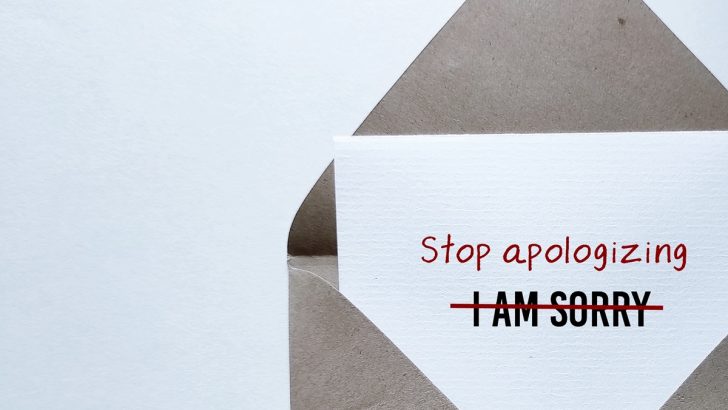We’ve all been there – apologizing for things that don’t actually warrant a ‘sorry.’ This habit can make us appear less confident and dilute the impact of genuine apologies.
Breaking the automatic sorry reflex isn’t about being less polite; it’s about communicating more effectively and maintaining your personal power.
These alternative phrases will help you express yourself clearly without unnecessarily diminishing your presence.
1. “Thank you for your patience” instead of “Sorry I’m late”
Lateness happens to everyone occasionally. Rather than starting with an apology that focuses on your mistake, acknowledge the other person’s generosity instead.
This phrase shifts the entire interaction from negative to positive. You’re recognizing their good quality (patience) rather than highlighting your shortcoming (tardiness).
The beauty of this alternative is that it works in countless situations – waiting for emails, standing in line, or during project delays. It preserves your dignity while still acknowledging the situation respectfully.
2. “I appreciate your understanding” instead of “Sorry for the confusion”
Mixups and miscommunications are inevitable parts of daily life. When clarifying a misunderstanding, lead with appreciation rather than apologizing for something that might not even be your fault.
This phrase acknowledges the other person’s flexibility without assuming blame. It creates a collaborative atmosphere where you’re working together through the confusion rather than positioning yourself beneath them.
Try using this in emails or conversations when clarifying details. You’ll notice people respond more positively when their understanding is recognized rather than when they receive unnecessary apologies.
3. “Let me clarify” instead of “Sorry, what I meant was”
Ever caught yourself apologizing before explaining your own thoughts? Stop that nonsense right now! Your ideas deserve space without a preemptive apology.
“Let me clarify” sounds confident and professional. It signals that you’re about to provide additional information without suggesting your original statement was somehow wrong or offensive.
This phrase is particularly powerful in meetings or debates when you need to expand on your point. It maintains your authority on the subject while ensuring your message is understood correctly – no apology necessary!
4. “I’d like to suggest an alternative approach” instead of “Sorry, but I disagree”
Many of us apologize before expressing a different opinion, as if having our own thoughts is somehow offensive! This undermines our credibility before we’ve even shared our idea.
Offering an alternative approach positions you as a problem-solver rather than an opponent. You’re contributing to the conversation constructively instead of just disagreeing.
Next time you have a different perspective in a meeting or conversation, try this phrase. You’ll likely find people are more receptive to your ideas when they’re presented confidently rather than apologetically.
5. “Thanks for catching that” instead of “Sorry I made a mistake”
Made an error? Join the club of literally every human ever! Instead of apologizing for being imperfect, express gratitude that the mistake was caught before causing bigger problems.
This response transforms a potentially embarrassing moment into a collaborative win. You’re acknowledging the error while focusing on the positive outcome and the helpful role the other person played.
This works brilliantly for typos in emails, small calculation errors, or minor oversights. The person who pointed out the error feels appreciated rather than put in the awkward position of receiving an unnecessary apology.
6. “I’m available after 3pm” instead of “Sorry I can’t meet earlier”
Your schedule belongs to you! There’s absolutely no need to apologize for having existing commitments or boundaries.
By stating when you ARE available rather than apologizing for when you’re NOT, you maintain control of your time while still being helpful. This subtle shift changes the entire tone of your communication from apologetic to assertive.
This approach works wonderfully for scheduling meetings, social gatherings, or any time-related request. You’re providing a solution (when you can meet) rather than focusing on a problem (when you can’t), all without a single sorry!
7. “May I finish my thought?” instead of “Sorry for interrupting”
Been talked over in a meeting? It happens to the best of us! But here’s the kicker – you don’t need to apologize when reclaiming your rightful speaking time.
“May I finish my thought?” is polite yet assertive. It reminds others that you were speaking first without making you seem apologetic for wanting to complete your contribution.
This phrase is especially valuable for those who find themselves frequently interrupted. Practice saying it calmly but firmly. Your ideas deserve to be heard in their entirety, and requesting that space isn’t something that requires an apology.
8. “I’ve decided to go in a different direction” instead of “Sorry, I changed my mind”
Changing your mind isn’t a crime! Yet many of us apologize profusely when we revise our decisions, as if consistency matters more than making the right choice.
Framing your change of heart as a decision rather than a mistake sounds more intentional and confident. You’re exercising your right to choose what’s best rather than doing something wrong that requires an apology.
Use this phrase when changing plans, pivoting on a project, or updating your preferences. People respect decisiveness more than they appreciate unnecessary apologies for normal human behavior like reconsidering options.
9. “I need” instead of “Sorry to bother you, but I need”
Have you noticed how often we apologize before asking for something completely reasonable? As if our basic needs are somehow an imposition on others!
Simply stating “I need” followed by your request is direct and appropriate. It acknowledges that your needs are valid without the self-deprecating apology that diminishes your request before you’ve even made it.
This works for everything from asking colleagues for information to requesting help with projects. Remember: if you’re asking for something legitimate that helps you do your job or live your life, no apology is necessary!
10. “I’m learning” instead of “Sorry I don’t know how”
Nobody was born knowing everything! Yet many of us apologize profusely for being in the perfectly normal state of not yet having mastered something.
“I’m learning” has an entirely different energy than an apology for lack of knowledge. It’s forward-looking, growth-oriented, and confident. You’re not sorry – you’re in the process of expanding your skills!
This phrase is perfect when you’re picking up new software, trying new responsibilities, or developing any skill. It signals competence (you’re actively learning) rather than deficiency (not knowing), all without that reflexive sorry that undermines your confidence.











